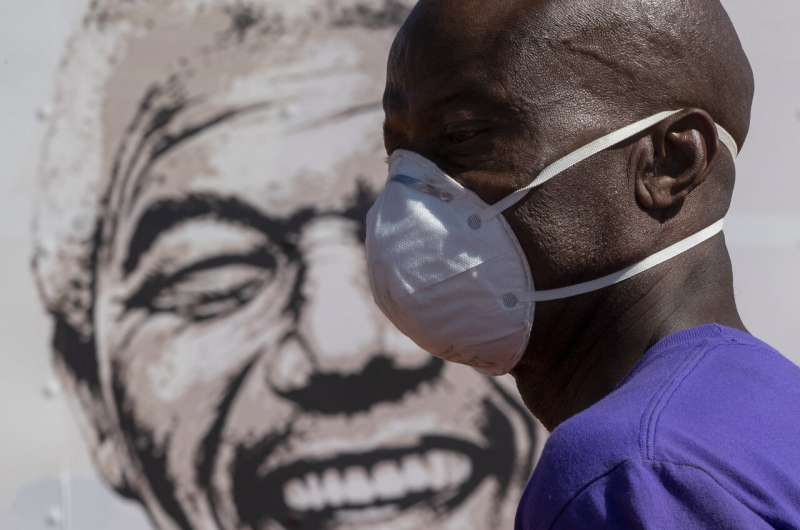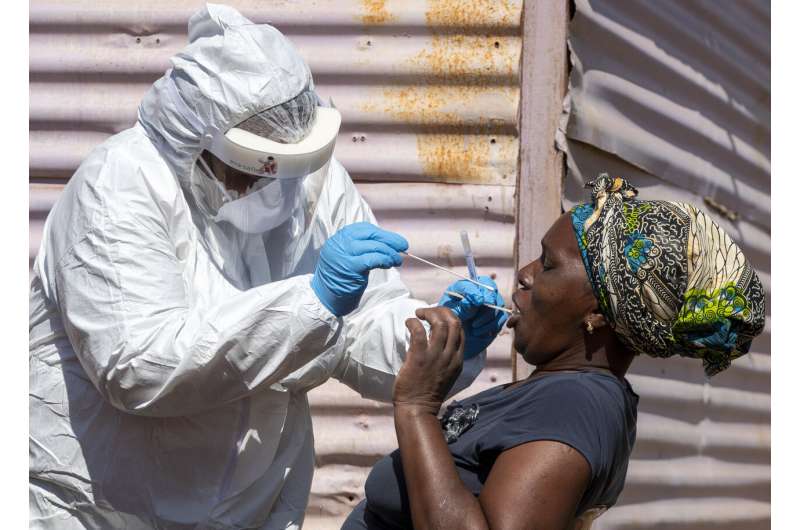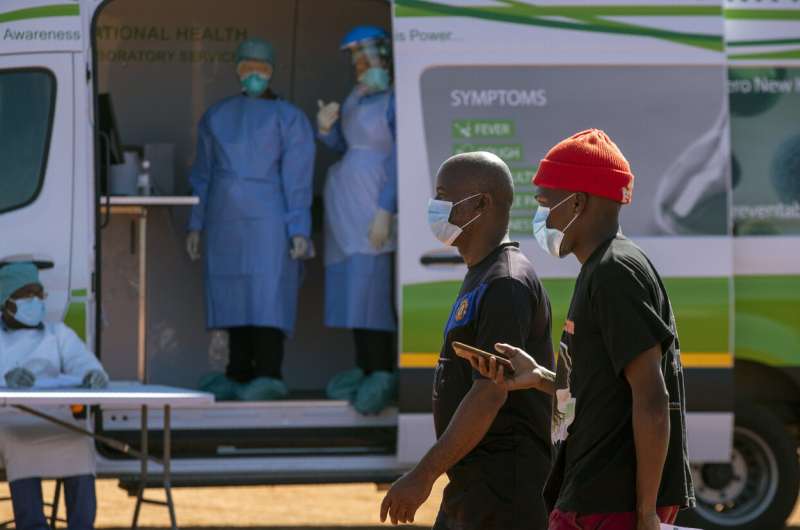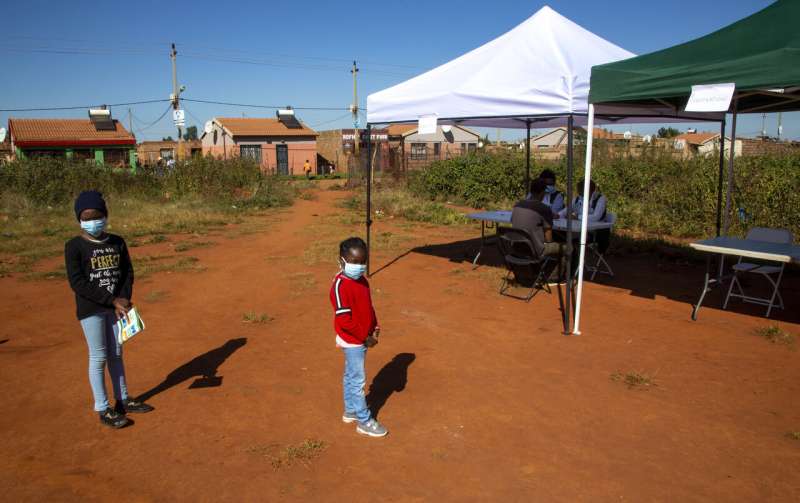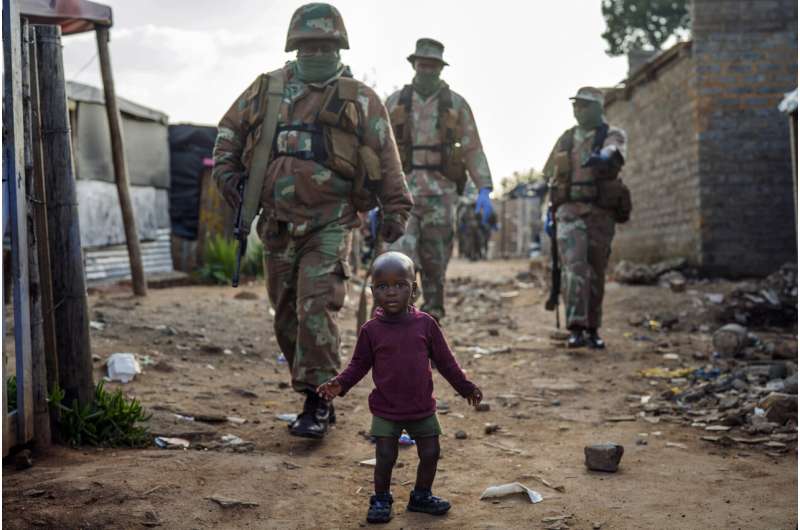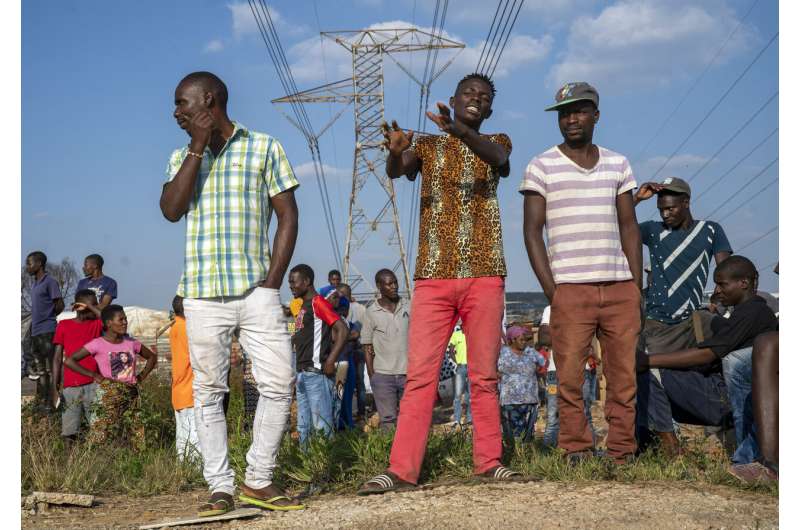A man wearing a face mask walks past a portrait of former South African president Nelson Mandela on a mobile clinic at Lenasia South, south Johannesburg, South Africa, Tuesday, April 21, 2020, during a campaign aimed to combat the spread of the COVID-19 Coronavirus. (AP Photo/Themba Hadebe)
Africa has registered a 43% jump in reported COVID-19 cases in the last week, highlighting a warning from the World Health Organization that the continent of 1.3 billion could become the next epicenter of the global outbreak.
Africa also has a "very, very limited" and "very, very strained" testing capacity, John Nkengasong, director of the Africa Centers for Disease Control and Prevention said in his weekly briefing on Thursday.
It means that the surge in infections on the continent is likely to be even higher in reality, he said.
WHO's recent report painted a grim picture for Africa. It warned the virus could kill more than 300,000 people and push 30 million into desperate poverty.
Africa still has time to avert such a disaster, but testing people and tracing virus cases is critical, said Nkengasong.
"It all depends on what we are discussing here," Nkengasong said, "which is, are you testing? Are you finding the cases? Are you isolating and tracking the contacts? It is not a prediction that means it must happen."
By Nkengasong's own criteria, Africa is struggling on the testing front.
In the two months since the continent began mobilizing to fight the outbreak, less than 500,000 tests have been conducted on a population of more than 1 billion. That's just 325 people tested per 1 million people, Nkengasong said. That's far lower than Italy, one of the world's worst-hit countries, he said by way of comparison.
-
A woman opens her mouth for the heath worker to collect a sample for coronavirus testing during the screening and testing campaign aimed to combat the spread of COVID-19 at Lenasia South, south Johannesburg, South Africa, Tuesday, April 21, 2020. (AP Photo/Themba Hadebe)
-
Men walk past health workers in a mobile testing clinic to queue for screening and test for COVID-19 at Lenasia South, south Johannesburg, South Africa, Tuesday, April 21, 2020, during a campaign aimed to combat the spread of Coronavirus. (AP Photo/Themba Hadebe)
-
Children queue on a dusty soccer field to be screened and tested for COVID-19 at Lenasia South, south Johannesburg, South Africa, Tuesday, April 21, 2020, during a campaign aimed to combat the spread of Coronavirus. (AP Photo/Themba Hadebe)
-
South African National Defense Forces patrol the Sjwetla informal settlement after pushing back residents into their homes, on the outskirts of the Alexandra township in Johannesburg, Monday, April 20, 2020. The residents were protesting the lack of food. Many have lost their income as South Africa is under a strict five-week lockdown in a effort to fight the coronavirus pandemic. (AP Photo/Jerome Delay)
-
Residents of the Sjwetla informal settlement gather to protest the lack of food, on the outskirts of the Alexandra township in Johannesburg, Monday, April 20, 2020. Many have lost their income as South Africa is under a strict five-week lockdown in a effort to fight the coronavirus pandemic. (AP Photo/Jerome Delay)
African governments reported nearly 26,000 cases as of Thursday, according to the Africa Centers for Disease Control and Prevention, up from just over 16,000 a week ago. Although those figures are still relatively small in the global picture, the sharp increase is a cause for concern, said Nkengasong. The previous week saw an increase of 29%.
"If you don't test, you don't find. And if you don't test, you are blinded. If you don't test, you are not ahead of the curve," Nkengasong said.
The Africa Centers for Disease Control has a target of conducting 1 million more tests in Africa over the next four weeks and 10 million tests in the next four months. The overall effort is badly hampered, Nkengasong said, by a major obstacle: The existing fragility of the health services in many African countries.
"I'd like to make sure I make this very clear," he said. "It is an uphill battle to build health systems while you need them. ... That is what we are actually doing now. We are playing catch-up and that is a very, very tough thing to do."
© 2020 The Associated Press. All rights reserved. This material may not be published, broadcast, rewritten or redistributed without permission.
